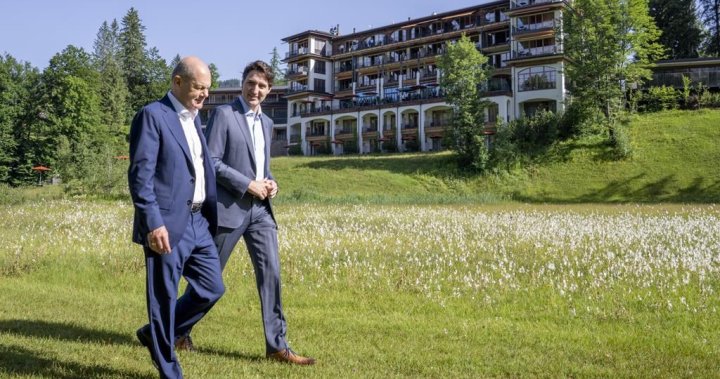German Chancellor Olaf Scholz’s visit to Canada comes at a critical time for Germany’s energy future, as Russia invades Ukraine, providing Canada with an opportunity to assist while also improving its own economy.
The highlight of the visit, the signing of a green energy deal with Prime Minister Justin Trudeau in Newfoundland on Tuesday, will make Germany the first client of a planned hydrogen production and export plant, the first of its type in Canada.
While the first cargo is expected to be years away, the agreement will usher in a new era in the long-standing allies’ relationship.
This partnership was put to the test earlier this year when Canada delayed to return a turbine for the Nord Stream 1 pipeline, which supplies natural gas to Germany and is being serviced in Montreal. Despite restrictions imposed on Russian energy as a result of the Ukraine conflict, the turbine was eventually returned in July in order to restore gas supply.
Trudeau and his administration were chastised for the decision, which they justified as critical for European gas supplies. Internal government documents released this month indicated that jobs and global inflation also played a role in the decision.
Scholz’s arrival in Montreal on Sunday, where he will be greeted by Deputy Prime Minister Chrystia Freeland, will be his first visit to Canada since succeeding longstanding chancellor Angela Merkel last December.
Trudeau previously met Scholz in Berlin in March and the two leaders held several discussions at the G7 summit in the Bavarian Alps in June.
The duo discussed not only the Russian turbine but also the possibilities of Canadian hydrogen exports, which Canada had been pushing to Germany and other nations since before Russia attacked Ukraine in February.
Trudeau also spoke with international leaders at the G7 to discuss how Canada could provide alternatives to Russian oil and gas, on which Europe relies and has been unwilling to limit or ban despite efforts to penalize Moscow for the conflict.
Germany obtains almost half of its natural gas from Russia and is searching for both short-term and long-term options to wean itself from Russian shipments.
At the summit’s conclusion news conference, Trudeau indicated that infrastructure used to transport liquefied natural gas might be converted to transport hydrogen as one example of how Canada could assist.
However, LNG infrastructure, like the proposed hydrogen factory in Stephenville, N.L., is years away from being a reality. The Shell-backed LNG Canada project in Kitimat, B.C., is under construction and scheduled to launch in 2025, while additional sites in Atlantic Canada are still in the planning phases.
In a new analysis, the International Institute for Sustainable Development stated that Canada’s LNG infrastructure will be too late to meet Europe’s present demands, and may even be rendered obsolete as the globe swings toward energy efficiency and away from fossil fuels.
The Stephenville plant, too, is considered a more long-term solution for Germany’s woes — something Trudeau admitted to Friday during a news conference in Les Iles-de-la-Madeleine, Que.
He stated that the negotiations with Germany are part of a larger strategy to reduce dependency on Russia and fossil fuels in general.
How can we ensure that this unlawful Russian invasion and Russia’s unreliability as an energy partner really incites and allows us all to pivot, not just off Russian oil and gas more rapidly, but off oil and gas as something we rely on so much? he said.
Natural Resources Minister Jonathan Wilkinson said Friday the Canada-Germany deal will set aggressive timelines and targets for starting hydrogen exports, and will mark the first step of a long-term collaboration.
Natural Resources Minister Jonathan Wilkinson stated on Friday that the Canada-Germany agreement would establish aggressive timetables and objectives for the launch of hydrogen exports and will be the first step in a long-term relationship.
However, it will establish certain dates for when we would like to see actual product going from Canada to Germany, and both will be rather aggressive.
He stated that both countries will commit to working with the business sector to attain those goals.
Canada’s hydrogen plan, launched in 2020, aims to make the country one of the top three hydrogen exporters in the world during the next 30 years. The International Renewable Energy Agency currently does not include Canada on its list of the six countries most likely to become hydrogen superpowers.
China, Europe, Japan, South Korea, the United States, and India hold this distinction.
According to their respective press offices, Scholz and Trudeau will also address their sustained support for Ukraine in the face of Russia’s aggression, as well as European security.
On Sunday, the two will meet with Canadian and German business executives in Montreal before seeing a local artificial intelligence institution.
They will next go to Toronto, where Trudeau will participate in a virtual conference on Russia’s annexation of Crimea, followed by a speech at the Canada-Germany Business Forum.
The tour will finish with the signing of an energy agreement in Stephenville and a visit to a hydrogen trade fair.
— with assistance from the Canadian Press

